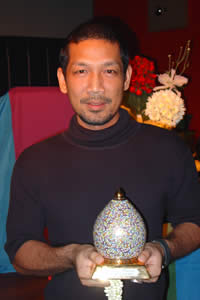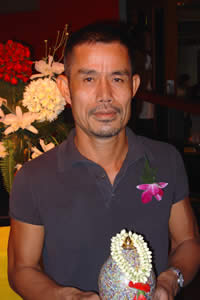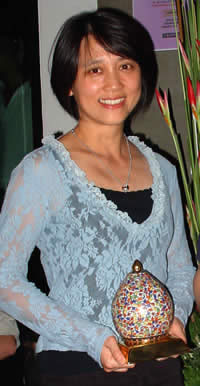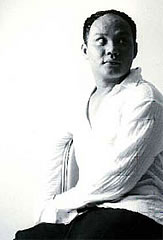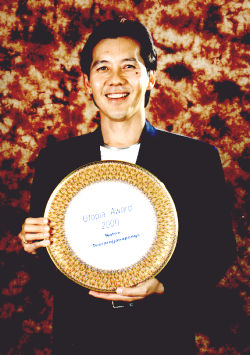
Celebrating
3 DECADES
of Service to Asia's
Gay & Lesbian Community!

|
Covid Recovery Discount: to help build your business back up, we are offering a 50% or higher discount off 12 months on any of our promotions !
|
|

 | |
|
|
Utopia
Awards 2005 Celebrating the 10th Anniversary
of the Utopia Website, 1995-2005
 For 6 years the annual Utopia Awards have been recognizing individuals and organizations that have contributed to improving the quality of life for the gay, lesbian, and transgendered communities in Asia. The Utopia website, the Internet's longest running resource for gay and lesbian Asia, is also celebrating its first decade of community service, so this year, along with our 2005 awardees, we would like to remember the work and dedication of Utopia Award recipients from the past five years as well. For 6 years the annual Utopia Awards have been recognizing individuals and organizations that have contributed to improving the quality of life for the gay, lesbian, and transgendered communities in Asia. The Utopia website, the Internet's longest running resource for gay and lesbian Asia, is also celebrating its first decade of community service, so this year, along with our 2005 awardees, we would like to remember the work and dedication of Utopia Award recipients from the past five years as well.
The unique design of the Utopia Award (above right) incorporates the shape of a lotus bud, hand-glazed with the six colors of the gay pride rainbow, using the techniques of classic Thai benjarong porcelain.
all images are copyright © 1999-2005, by Utopia, except where noted.
Please contact us for permission to reproduce.
|
2005 Utopia Awardees:
 Our first Utopia Award for 2005 goes to Rosanna Flamer-Caldera who has made a significant impact in lesbian, gay, bisexual, transgender, intersex and queer advocacy in Sri Lanka, the Asian region, and internationally. A founding member of Women's Support Group (1999), the only LBT organization in Sri Lanka and Equal Ground (2004), a mixed LGBTIQ organization in Sri Lanka, Rosanna helped pave the way for LGBTIQ rights in the island nation. As an open lesbian she has championed LGBTIQ issues in the general public through TV, radio and print media, challenging the human rights community to expand their scope to include LGBTIQ issues. Rosanna's co-authorship of "Human, Right?", launched her efforts towards achieving an equitable status for all sexual orientations and gender identities through the human rights framework. In her capacity as the International Lesbian and Gay Association representative for Asian females, Rosanna was instrumental in organizing the ILGA-Asia Regional Conference in Mumbai, India (2002). She has expanded her commitment to defending LGBTIQ persons around the globe when elected Co-Secretary General of ILGA in 2003, a post she continues to hold. Our first Utopia Award for 2005 goes to Rosanna Flamer-Caldera who has made a significant impact in lesbian, gay, bisexual, transgender, intersex and queer advocacy in Sri Lanka, the Asian region, and internationally. A founding member of Women's Support Group (1999), the only LBT organization in Sri Lanka and Equal Ground (2004), a mixed LGBTIQ organization in Sri Lanka, Rosanna helped pave the way for LGBTIQ rights in the island nation. As an open lesbian she has championed LGBTIQ issues in the general public through TV, radio and print media, challenging the human rights community to expand their scope to include LGBTIQ issues. Rosanna's co-authorship of "Human, Right?", launched her efforts towards achieving an equitable status for all sexual orientations and gender identities through the human rights framework. In her capacity as the International Lesbian and Gay Association representative for Asian females, Rosanna was instrumental in organizing the ILGA-Asia Regional Conference in Mumbai, India (2002). She has expanded her commitment to defending LGBTIQ persons around the globe when elected Co-Secretary General of ILGA in 2003, a post she continues to hold.
|
 Our second Utopia Award for 2005 goes to Dr Peter Jackson for his landmark publications and his contributions towards the development of queer studies in the region. A Senior Fellow in Thai History in the Research School of Pacific and Asian Studies at the Australian National University in Canberra, Dr Jackson specializes in the cultural history of modern Thailand and his main research interests are the histories of Buddhism, gender, sexuality, capitalism and globalization. As an author or co-editor his books have included such titles as "Dear Uncle Go: Male Homosexuality in Thailand", "Genders and Sexualities in Modern Thailand", "Multicultural Queer: Australian Narratives", "Lady Boys, Tom Boys, Rent Boys: Male and Female Homosexualities in Contemporary Thailand" and "Gay and Lesbian Asia: Identity, Community, Culture". In 2001 he co-founded AsiaPacifiQueer, an Australia-based network of scholars researching homosexuality and transgenderism in Asia. He was also instrumental in organizing Sexualities, Genders and Rights in Asia: First International Conference of Asian Queer Studies in Bangkok in July, 2005, the largest gathering to date of scholars, human rights activists, artists and film makers involved in researching and documenting Asian gay, lesbian, and transgender cultures. Our second Utopia Award for 2005 goes to Dr Peter Jackson for his landmark publications and his contributions towards the development of queer studies in the region. A Senior Fellow in Thai History in the Research School of Pacific and Asian Studies at the Australian National University in Canberra, Dr Jackson specializes in the cultural history of modern Thailand and his main research interests are the histories of Buddhism, gender, sexuality, capitalism and globalization. As an author or co-editor his books have included such titles as "Dear Uncle Go: Male Homosexuality in Thailand", "Genders and Sexualities in Modern Thailand", "Multicultural Queer: Australian Narratives", "Lady Boys, Tom Boys, Rent Boys: Male and Female Homosexualities in Contemporary Thailand" and "Gay and Lesbian Asia: Identity, Community, Culture". In 2001 he co-founded AsiaPacifiQueer, an Australia-based network of scholars researching homosexuality and transgenderism in Asia. He was also instrumental in organizing Sexualities, Genders and Rights in Asia: First International Conference of Asian Queer Studies in Bangkok in July, 2005, the largest gathering to date of scholars, human rights activists, artists and film makers involved in researching and documenting Asian gay, lesbian, and transgender cultures.
|
Previous Utopia Award Honorees:
Blue Diamond Society (2004) Nepal's first LGBT rights group, founded in 2001, Blue Diamond is a rapidly expanding community-based organization which works on HIV/AIDS prevention and advocacy services for all sexual minorities in Nepal. It operates a drop-in centre, a free STD clinic and does outreach work, having already established informal networks in more than 15 cities throughout the country. The 3rd of its annual pride parades was held in Katmandu in August 2004, and more than 50 Nepalese women have now joined its lesbian, bisexual and transgender support group set up over a year ago. Blue Diamond is working in a country where sexual minorities face extortion, expulsion from family, rape, arbitrary detention, blackmail and murder. Blue Diamond's award was accepted by its founder and driving force, Sunil Pant who has been tireless in focusing the world's attention on violations of the human rights of these minorities - most recently the arbitrary arrest of 39 Blue Diamond members in August 2004.
|
Billy Wong (2004) The first Long Yang Club was founded in London in 1983 to provide a friendly and supportive social environment for gay Asians and non-Asians. The Club was named after Lord Long Yang, the King of Wei's favourite during the Chinese Zhou Dynasty, seen by later generations in China as a paragon and symbol of romantic male love. Billy Wong, a Malaysian from Ipoh who had seen enormous value in the Club's activities, hit in 1992 upon the idea of 'going global', and founded the Club's international wing, the LYCI. Since then, as LYCI's International Coordinator, he has overseen the founding of Long Yang Clubs in over 35 cities around the world, including Hong Kong, Manila and Bangkok. Billy has given up huge amounts of his time to help fledgling Clubs, and for many years he paid for the expense of doing this, and of maintaining the website, out of his own pocket. He has helped to build the world's largest network of gay Asian/non-Asian groups.
|
Pakorn Pimton (2004) Pakorn is best known in Thailand as a dancer, choreographer, and as a member of the Thai acting group Two-Eight. After doing grass roots AIDS education for 9 years, he became active in Glum Gay Tan Pai AIDS, a group of performers that focus on AIDS prevention and visit correctional facilities to educate prisoners, one of Thailand’s most overlooked risk groups. In 1999, Pakorn founded and helped coordinate the kingdom’s first pride festival, the Bangkok Gay Festival, which culminated with Thailand's first pride parade on Silom Road. Pakorn now works as a consultant for the new Bangkok government, focusing on education to increase awareness of issues relevant to gays and lesbians. In this role he has been helping to disseminate reading material about gay issues to more than 500 libraries, to facilitate regular public lectures, and to set up information hotlines.
|
Poonsak Sanchan (2004) The first Phuket Gay Festival was held in 1999 shortly after Bangkok's first festival. A coalition of gay business and website owners organized the first parade. Poonsak Sanchan, known affectionately as Daeng, was one of the original founders and has continued at the helm of the Festival. As Phuket's unofficial gay ambassador, Daeng has managed to gain consistent support from the local police, the Mayor and other political leaders for Phuket's annual event, with the 6th annual parade slated for early 2005. On the beach with a megaphone, from a public stage, in the press, or marching at the front of the parade, Daeng is an out and proud voice for the community year after year. The 2004 parade had nearly 1,000 marchers, including school bands and community members, and was enjoyed by over 30,000 members of the public.
|
Jim Lumsden (2004) For years Jim has been notable for his philanthropic activities, in keeping with his philosophy of having fun while helping others. In 2000 he joined with other gay business owners in Pattaya and proposed that they organize a year-round series of charity events, culminating in a pride parade on World AIDS Day. The first Pattaya Gay Festival that year was a spectacular success, and throughout each succeeding year an array of events has taken place under Festival auspices. Jim can be found at the microphone at all these events, urging the participants to contribute to the chosen Festival charities and leading by example with his own generous contributions. To date over ten million Baht has been raised for the AIDS charity HEARTT 2000, the Naklua Drug Rehabilitation Centre, and other charities. In 2003, Jim was awarded Rotary's Paul Harris Fellowship by the business community in Pattaya, in recognition of his tireless work for humanitarian causes.
|
Senator Jon Ungpakorn (2003) A Utopia Award was presented to Senator Jon Ungpakorn for his pioneering chairmanship of Thailand's AIDS Access Foundation and his untiring use of his public position to promote the political and public health rights of all Thais living with HIV/AIDS. For many years a noted champion of gay and lesbian rights, he has campaigned tirelessly for those living with HIV/AIDS not to be excluded from the Thai national health insurance system. He has publicly opposed those who seek to enrich themselves by taking advantage of AIDS sufferers, and he has been a leader in the fight to convince international pharmaceutical companies to supply essential drugs at the lowest possible prices. Senator Ungpakorn has been a guiding light in the Access Foundation, which provides long-term care and support services for people living with HIV/AIDS, including anonymous telephone counseling, welfare services, health clinics, home care and advocacy on drug access.
|
Wang Ping (2003) A Utopia Award was given to Wang Ping for her persistence in keeping gay and lesbian rights at the forefront of public debate in Taiwan, and for her inspiring leadership of Taiwan's premiere women's and GLBT rights organization. Wang Ping's activism began in the 1980s, when she championed the rights of Taiwanese women. Over the next two decades, she began to speak out on issues of importance to the gay and lesbian community, still to this day seriously marginalized in Taiwan. This culminated in her authorship of a comprehensive "Report on LGBT Human Rights in Taiwan", released in 2002. Wang Ping is Secretary-General of the Gender/Sexuality Rights Association of Taiwan (GSRAT), founded in 1999. This has involved her in lobbying the Government for the legalization of same-sex unions, gay inheritance rights, and joint property, insurance and adoption rights. Her high public profile was recognized last year when she was given a prestigious medal by the Mayor of Taipei for her contribution to the social development of that city.
|
Chung To (2003) A Utopia Award honored Chung To for his founding and chairmanship of the Chi Heng Foundation, the foremost gay rights advocacy group in Hong Kong, and for his pioneering role in AIDS awareness outreach programs in China. Chi Heng Foundation promotes the rights of the tongzhi (queer "comrade") community through political advocacy, public education, media campaigns and community building. Chung To has served as a full time volunteer without any salary, sponsoring gay film festivals, lobbying for legislative protection of minorities, and encouraging the development of tongzhi websites. Under Chung To's leadership, the Chi Heng Foundation has expanded into mainland China. UNAIDS named Chi Heng's community-based MSM project as the Best Practice Model for China. Under a separate project in Henan, Chi Heng is sponsoring over 700 students whose parents have died of or are dying of AIDS. He has also been Chairman of AIDS Concern and a member of the AIDS Prevention and Care Committee appointed by the Hong Kong Government.
|
Parinya Jaroenphon (2003) A Utopia Award was presented to Parinya Jaroenphon for her exceptional courage and outspokenness, which have made her a role model for transgendered people worldwide. Affectionately known as "Nong Toom" to all Thai, who have taken her to their hearts, Parinya Jaroenphon took up muay thai (kick-boxing) as a 12-year-old boy in Chiang Mai. Her success in the ring was accompanied by her growing realization that she was in fact a woman, and she single-mindedly set out to earn enough from her boxing prowess to pay for a transformation to her true gender. Her inspiring story is told in the feature film, Beautiful Boxer. Although she is now a woman, she has steadfastly lent her support to gay causes, and was a co-founder and supporter of the Bangkok Gay Festival.
|
Bruno Forrer (2002) A Utopia Award honored restaurateur and philanthropist, Bruno Forrer, a shining example of what one individual can do to change society. An openly gay businessman and outspoken member of Pattaya's business community for more than three decades, Bruno has quietly and unselfishly provided much needed support to Thailand's developing gay communities. Without fanfare, he has offered the resources of his business for dozens of fundraising events. He is a generous philanthropist and a role model for gay businessmen throughout Thailand. Good friend and Pattaya gay businessman, Gordon May, accepted the Utopia Award on behalf of Bruno.
|
Daychawut Chantakaro (2002) Honoree Daychawut Chantakaro is a famous Bangkok entertainer and inspiring role model ro Thailand gays and transgenders. Day's first big stage appearances were in the cabaret at the world famous Rome Club where she quickly became a star. She went on to act in two major stage plays and appear in a hit television soap opera. Her ground-breaking autobiography, Behind the Showgirl's Curtain, was published early in 2002. In it she speaks positively about katoey (ladyboys), encouraging the public to accept their nature. Day's struggles and achievements have made her a hero to Thailand's gay and transgender communities.
|
Alex Au (2002) A Utopia Award Utopia Award was presented to Alex Au who has consistently been at the forefront of catalytic events for Singapore's gay community. He has been active in PLU ("People Like Us"), the first grassroots group of gay, lesbian and bisexual Singaporeans, to give momentum to gay consciousness and promote public discussion of gay issues. He is the webmaster of Yawning Bread which archives his frequent reports on Singaporean gay issues and other sharp social commentary.
|
ProGay Philippines (2002) A Utopia Award was presented to ProGay Philippines (the "Progressive Organization of Gays in the Philippines"). Founded in 1993, ProGay describes itself as a "network of grassroots gay men, lesbians, bisexuals and transsexuals" that conducts community forums and public protests to confront homophobia and discrimination. These have led to public debate on the ban on gays in Filipino military, legalization of gay unions, lower prices for AIDS drugs, and solidarity with international gay rights issues such as the May 2001 Egypt arrests. ProGay's current president, Oscar Atadero, accepted the Utopia Award on behalf of his organization.
|
Dédé Oetomo (2001) Dédé Oetomo is Indonesia's most respected gay rights activist. He is the founder and coordinator of Gaya Nusantara, based in Surabaya, which works for the physical, psychological and social health of gay men, transgenders, and male sex workers. Under Dédé's guidance, Gaya Nusantara publishes a monthly national magazine, runs a twice-weekly telephone helpline, provides peer counseling by correspondence and in face-to-face encounters, and carries out outreach work to the media, human rights organizations and political parties. Dédé Oetomo has been working actively in pursuit of gay and lesbian rights for two decades and is currently technical advisor in the male sexual health division of the ASA (Aksi Stop AIDS) program in Indonesia.
|
Pink Triangle Foundation (2001) Karthini Slamah received the Utopia Award given to the Pink Triangle foundation, Malaysia's most prominent HIV activists. The Pink Triangle Foundation was the first NGO in Malaysia to work at the community level on HIV and sexuality issues, having begun work on behalf of Kuala Lumpur's marginalized gay community in 1987, shortly after the first cases of AIDS were diagnosed in Malaysia. By the early 1990s it was well established, with its own HIV education and support programs, one of the best-known of which is Positive Living, a support and care project specifically for people living with HIV/AIDS. Today the Pink Triangle Foundation has 18 staff and about 100 volunteers involved in its HIV prevention and support programs. The environment for gays and lesbians in Malaysia is still not a welcoming one, and the Pink Triangle Foundation has been truly heroic in its determination and single-mindedness in difficult circumstances.
|
Wannasak Sirilar (2001) Honoree Wannasak Sirilar is a pioneering Thai stage performer. Over the past few years, Thailand's lively performing arts scene has begun to realize that it has a true star in its midst, a young artist who explores important gay themes in his hilarious but thought- provoking one-man performances. Wannasak Sirilar is still only 32 and so we have many more years in which to be entertained and moved by his dramatic talents. During his university studies of Pali and Sanskrit he demonstrated a flair for drama and dance. HeHe studied these with several theatrical mentors, soon winning an award for Best New Talent. He has continued his work in mainstream professional theatre but, wishing to explore gay themes in new and challenging ways, he has written and performed his now famous one-man shows, which have introduced homosexual themes into Thai theater and broadened public discussion of gay issues.
|
Natee Teerarojjanapongs (2000) The Fraternity for AIDS Cessation in Thailand (FACT) was formed in the late 1980s by an openly gay Thai man, Natee Teerarojjanapongs, who sought to unite Thailand's factionalized gay businesses to fend off a growing epidemic of HIV infection. FACT’s most celebrated successes have been its AIDS education activities. It began by sending its White Line Dance Troup to gay bars and saunas, but soon extended its orbit to wider Thai society, performing in factories, schools and shopping centers. Its current focus is AIDS education among very high-risk groups, particularly MSM at outdoor locations in Bangkok, who are marginalized even by the gay community itself. The founder of FACT effectively used the media and his personal gift for theater to cultivate understanding and save countless thousands of lives.
|
Yongyoot Thongkongtoon (2000) Movie-goers around the world have been treated to director Yongyoot Thongkongtoon's landmark movie, Sathree Lex (Iron Ladies), which richly portrayed the daily challenges faced by many Thai gays. With an outstanding ensemble of young actors, Satree Lex tells the true story of a provincial volleyball team, made up almost entirely of gay and transgendered men, which went on to win the national championship. With its earthy gay slang and a compelling theme of inclusiveness and tolerance, the movie portrays gays as different, but equally capable, and able to be embraced honestly by both family and society. This message found a ready response in mainstream society and the movie quickly became the second highest-grossing Thai film of all time.
|
Floating Lotus Communications Company (2000) In 1986, a small publishing house was established in Bangkok to produce books which dealt honestly with the reality of gay and lesbian life in Thailand and other Asian countries. One of the company’s successful imprints is Bua Luang Books, which published Peter Jackson’s landmark study, Dear Uncle Go, which was nominated for an American Library Association Award in 1996. Another well-known imprint is Floating Lotus Books, which features translations, biographies and the acclaimed travel guides, The Men of Thailand and The Men of Vietnam. Through its publishing efforts, the company has appealed to Thai and foreign readers, throwing much-needed and thoughtful light on Thailand’s growing gay community. Most importantly, its publications have sensitized the world to the unique and complex gay and lesbian subcultures of Asia. An inaugural Utopia Award goes to the now-prestigious Floating Lotus Communications Company, whose partners Samorn Chaiyana and Eric Allyn still labour to produce ground-breaking books.
|
Anjaree Group (2000) Until the 1980s, there was little public acknowledgement of same-sex female relationships in Thailand as legitimate or meaningful. This discouraging situation meant that Thai lesbians felt that their pride and self-respect were compromised. In the early 1990s, Anjana Suvarnanonda and a small number of other women established the Anjaree Group to encourage public awareness of tom-dees (tomboys and ladies) to give public voice to the issues which concerned them, and to organize social activities for women who love women. They named it Anjaree, a clever play on words meaning "differing behavior". As the only organized grassroots homosexual rights organization to go public, they have often shouldered the burden of articulating the rights of gay men and transgendered people as well. To a great extent, their visibility and activism helped to overturn misguided anti-gay policies announced by the Rajabaht teachers colleges as well as Thai television authorities. In addition, their efforts have brought increased acceptance and pride to many Thai women.
|
For more information and photos from last year's award ceremony, please click here |

|
|




Phnom Pehn's gay men-only boutique hotel, spa, pool and restaurant...

|


QUNCI VILLAS, a gay-friendly, gay-managed tropical resort on the heavenly island of Lombak, just next to Bali...

|



At Bangkok Pride (photo: Amp Puttipong)

|
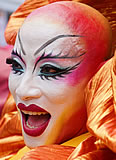

At Bangkok Pride (photo: Siam Pride)

|
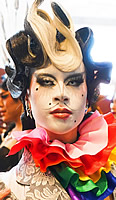

At Bangkok Pride (photo: Siam Pride)

|


At Bangkok Pride (photo: Siam Pride)

|


At Tokyo Rainbow Pride

|


Dynamic duo at Cambodia Pride
 |


Special photo exhibition by Mark Leighton!

|
|












 For 6 years the annual Utopia Awards have been recognizing individuals and organizations that have contributed to improving the quality of life for the gay, lesbian, and transgendered communities in Asia. The Utopia website, the Internet's longest running resource for gay and lesbian Asia, is also celebrating its first decade of community service, so this year, along with our 2005 awardees, we would like to remember the work and dedication of Utopia Award recipients from the past five years as well.
For 6 years the annual Utopia Awards have been recognizing individuals and organizations that have contributed to improving the quality of life for the gay, lesbian, and transgendered communities in Asia. The Utopia website, the Internet's longest running resource for gay and lesbian Asia, is also celebrating its first decade of community service, so this year, along with our 2005 awardees, we would like to remember the work and dedication of Utopia Award recipients from the past five years as well. Our first Utopia Award for 2005 goes to Rosanna Flamer-Caldera who has made a significant impact in lesbian, gay, bisexual, transgender, intersex and queer advocacy in Sri Lanka, the Asian region, and internationally. A founding member of Women's Support Group (1999), the only LBT organization in Sri Lanka and Equal Ground (2004), a mixed LGBTIQ organization in Sri Lanka, Rosanna helped pave the way for LGBTIQ rights in the island nation. As an open lesbian she has championed LGBTIQ issues in the general public through TV, radio and print media, challenging the human rights community to expand their scope to include LGBTIQ issues. Rosanna's co-authorship of "Human, Right?", launched her efforts towards achieving an equitable status for all sexual orientations and gender identities through the human rights framework. In her capacity as the International Lesbian and Gay Association representative for Asian females, Rosanna was instrumental in organizing the ILGA-Asia Regional Conference in Mumbai, India (2002). She has expanded her commitment to defending LGBTIQ persons around the globe when elected Co-Secretary General of ILGA in 2003, a post she continues to hold.
Our first Utopia Award for 2005 goes to Rosanna Flamer-Caldera who has made a significant impact in lesbian, gay, bisexual, transgender, intersex and queer advocacy in Sri Lanka, the Asian region, and internationally. A founding member of Women's Support Group (1999), the only LBT organization in Sri Lanka and Equal Ground (2004), a mixed LGBTIQ organization in Sri Lanka, Rosanna helped pave the way for LGBTIQ rights in the island nation. As an open lesbian she has championed LGBTIQ issues in the general public through TV, radio and print media, challenging the human rights community to expand their scope to include LGBTIQ issues. Rosanna's co-authorship of "Human, Right?", launched her efforts towards achieving an equitable status for all sexual orientations and gender identities through the human rights framework. In her capacity as the International Lesbian and Gay Association representative for Asian females, Rosanna was instrumental in organizing the ILGA-Asia Regional Conference in Mumbai, India (2002). She has expanded her commitment to defending LGBTIQ persons around the globe when elected Co-Secretary General of ILGA in 2003, a post she continues to hold.
 Our second Utopia Award for 2005 goes to Dr Peter Jackson for his landmark publications and his contributions towards the development of queer studies in the region. A Senior Fellow in Thai History in the Research School of Pacific and Asian Studies at the Australian National University in Canberra, Dr Jackson specializes in the cultural history of modern Thailand and his main research interests are the histories of Buddhism, gender, sexuality, capitalism and globalization. As an author or co-editor his books have included such titles as "Dear Uncle Go: Male Homosexuality in Thailand", "Genders and Sexualities in Modern Thailand", "Multicultural Queer: Australian Narratives", "Lady Boys, Tom Boys, Rent Boys: Male and Female Homosexualities in Contemporary Thailand" and "Gay and Lesbian Asia: Identity, Community, Culture". In 2001 he co-founded AsiaPacifiQueer, an Australia-based network of scholars researching homosexuality and transgenderism in Asia. He was also instrumental in organizing Sexualities, Genders and Rights in Asia: First International Conference of Asian Queer Studies in Bangkok in July, 2005, the largest gathering to date of scholars, human rights activists, artists and film makers involved in researching and documenting Asian gay, lesbian, and transgender cultures.
Our second Utopia Award for 2005 goes to Dr Peter Jackson for his landmark publications and his contributions towards the development of queer studies in the region. A Senior Fellow in Thai History in the Research School of Pacific and Asian Studies at the Australian National University in Canberra, Dr Jackson specializes in the cultural history of modern Thailand and his main research interests are the histories of Buddhism, gender, sexuality, capitalism and globalization. As an author or co-editor his books have included such titles as "Dear Uncle Go: Male Homosexuality in Thailand", "Genders and Sexualities in Modern Thailand", "Multicultural Queer: Australian Narratives", "Lady Boys, Tom Boys, Rent Boys: Male and Female Homosexualities in Contemporary Thailand" and "Gay and Lesbian Asia: Identity, Community, Culture". In 2001 he co-founded AsiaPacifiQueer, an Australia-based network of scholars researching homosexuality and transgenderism in Asia. He was also instrumental in organizing Sexualities, Genders and Rights in Asia: First International Conference of Asian Queer Studies in Bangkok in July, 2005, the largest gathering to date of scholars, human rights activists, artists and film makers involved in researching and documenting Asian gay, lesbian, and transgender cultures.


